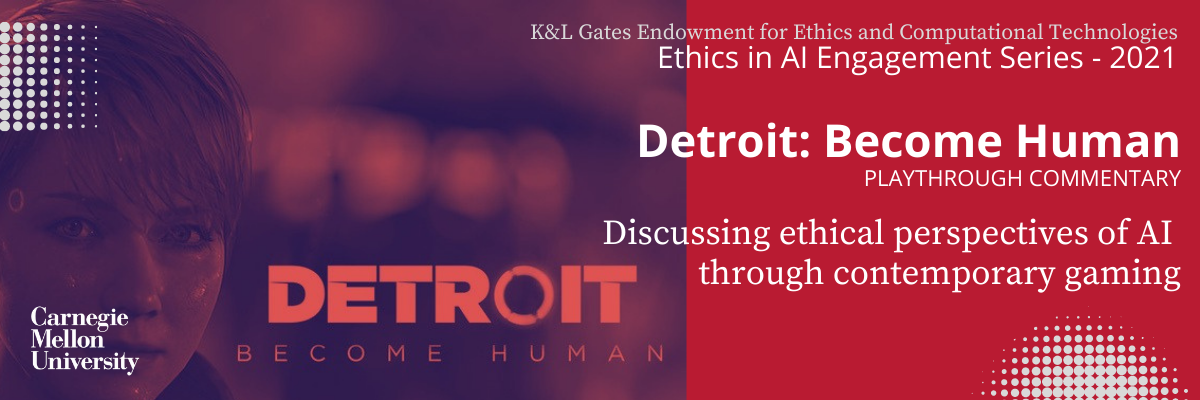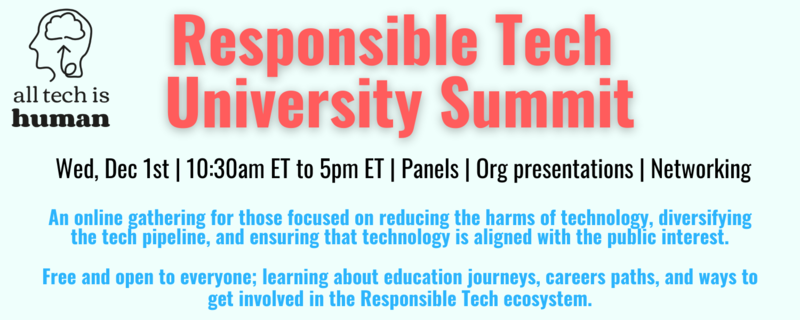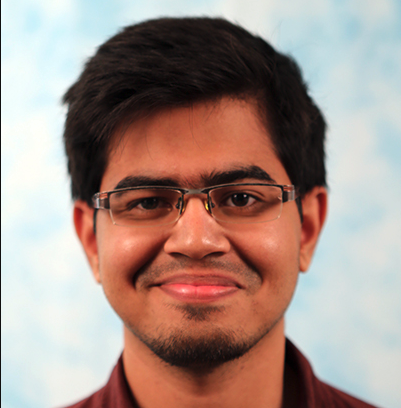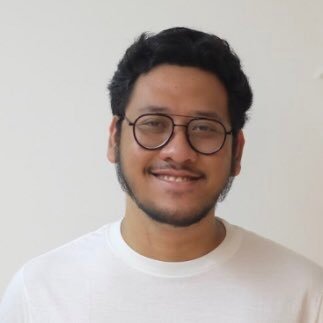July 27th: Discussing ethical perspectives of AI through contemporary gaming

The first event, entitled ‘Discussing ethical perspectives of AI through contemporary gaming’, took an inventive new approach where the panel will talk about AI ethics with a game playthrough running as a point of discussion. The game in question, Detroit: Become Human, is a game released in 2018 by Quantic Dream. It’s a narration-driven adventure game set in the near future where humanoid androids are commonplace. The backdrop of the game touches on a lot of the issues that can arise if intelligent AI became commonplace and, even further, sentient.
The event was opened by Professor Illah R. Nourbakhsh, and featured Beatrix (Bea) Livesey-Stephens leading the gameplay, Abhijat Biswas providing commentary on relevant ethical issues in AI deployment based on the game and Adya Danaditya moderating
The event was held on July 27th, 2021 via Twitch.
|
Illah R. Nourbakhsh is a K&L Gates Professor of Ethics and Computational Technologies at Carnegie Mellon University, inaugural Executive Director of the Center for Shared Prosperity, and co-director of the Community Robotics, Education and Technology Empowerment Lab |
Abhijat Biswas is a PhD student in the Robotics Institute at CMU where he works on getting robots and other autonomous systems to understand human non-verbal signals for safer and more efficient human robot collaborations. |
Adya Danaditya is a Master of Information Technology Strategy student at Carnegie Mellon University, with a concentration on Politics and Strategy where he mainly studies ethical issues surrounding the use of AI and the usage of social media for political purposes |
Beatrix (Bea) Livesey-Stephens is a Linguistics student at the University of Aberdeen and has previously done research on the moral permissibility of human-android relations and its implications for human relations |
November 3rd: Artificial Intelligence and the Future of Creativity

Creativity is considered by many as the new frontier of Artificial Intelligence. And yet, many others consider creativity a process that is truly human, and therefore not bound by quantifiable rules like most AI problems. Three experts from Carnegie Mellon University—a worldwide leader in AI—and the University of Pittsburgh will explore the intersection of technology in creative practices including music, architecture, and literature. Together they’ll explore how AI will, and should, shape the future of human creativity.
This panel is presented in partnership with the City of Asylum. City of Asylum builds a just community by protecting and celebrating creative free expression. We provide sanctuary to endangered literary writers, so that the writers can continue to write and their voices are not silenced. We offer a broad range of free literary, arts, and humanities programs in a community setting to build social equity through cultural exchange.
The event was held on November 3rd, 2021 and moderated by City of Asylum's executive director Andrés Franco. Recording of the event is available at this link
|
Joshua Bard is an architectural educator conducting applied research at the intersection of construction culture and robotic technology. He also works with historians, material scientists, and tradespeople immersed in theoretical and tacit knowledge of building construction. He is the Associate Professor in the School of Architecture and Associate Head for Design Research, Carnegie Mellon University. |
Roger B. Dannenberg is Emeritus Professor of Computer Science at Carnegie Mellon University. A trumpet player, composer, and scientist, he is known internationally for his pioneering work in Computer Music and as co-creator of Audacity, the world’s most popular audio editing software. |
Annette Vee is Associate Professor of English and Director of the Composition Program at the University of Pittsburgh, where she teaches graduate and undergraduate courses on digital composing, pedagogy, and computational culture. Her current research interests include blockchain architecture, digital art and automating writing from amanuenses to AI. |
November 6th: Where Does Our Mental Health Fit in a Digital Future

This lecture discussed the good and bad effects of online platforms like social media and other forms of computer-mediated communications on our mental health and interpersonal relationship. The discussion will reflect findings from Professor Robert E. Kraut's 25 years of research in this field and historical progresses in technology-mediated communication
This talk is presented in partnership with CompFest. CompFest is the biggest student-led computing and information technology conference in Indonesia, comprised of seminars, competitions, bootcamps and job fairs held annually. The conference is proudly hosted by students of the Faculty of Computer Science, Universitas Indonesia and this year's event is the 13th iteration of CompFest.
The event is held on November 6th, 2021 and moderated by CEO of diceritain.id, Lathifah Dinar.
|
Dr. Robert Kraut is the Herbert A. Simon Professor Emeritus of Human-Computer Interaction at Carnegie Mellon University. He has broad interests in the design and social impact of computing and has conducted empirical research on online communities, the social impact of the internet on personal relationships and psychological well-being, the design of information technology for small-group intellectual work, the communication needs of collaborating scientists, the impact of business computer technologies on organizational networks, employment quality, and home-based employment. He is a fellow of both the Association for Psychological Science and the Association of Computing Machinery (ACM) and in 2016 won the ACM SigCHI Lifetime Achievement in Research Award. |
December 1st: All Tech Is Human University Summit

All Tech Is Human, a non-profit committed to building the Responsible Tech pipeline, is putting on its first Responsible Tech University Summit! This exciting gathering is free and open to everyone (not just students) is focused on uniting multiple stakeholders, discussing career paths and education journeys, and learning where the Responsible Tech movement is headed.
Founded in 2018 and based in Manhattan with a global audience, All Tech Is Human is a non-profit organization that has intentionally brought together a diverse range of individuals and organizations across civil society, government, and industry. Their aim is to grow the Responsible Tech field by promoting knowledge-sharing and collaboration among multiple stakeholders in order to co-create a better tech future.
The K&L Gates Endowment on Ethics and Computational Technologies is supporting this event as a University Partner for this event. Details for the roster and registration for the event is available here



